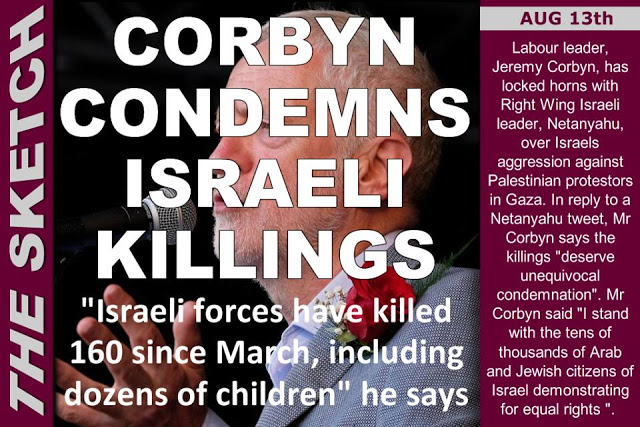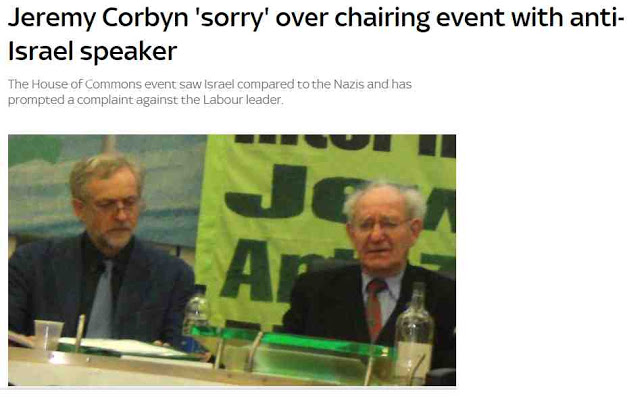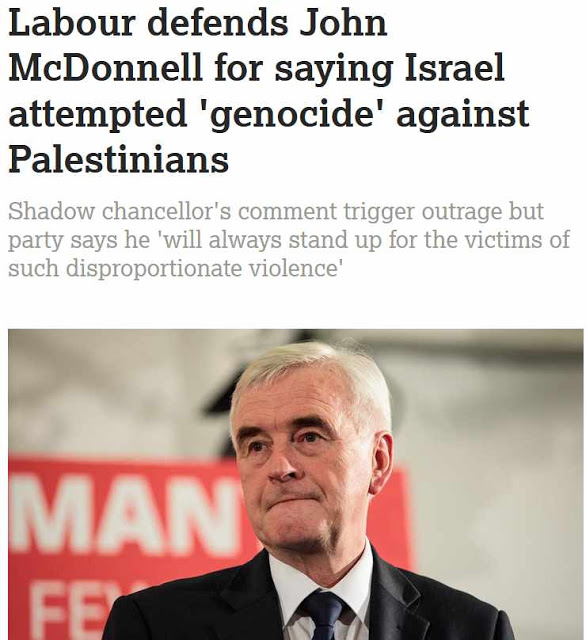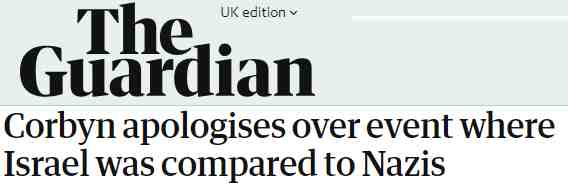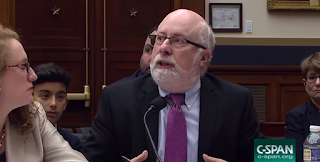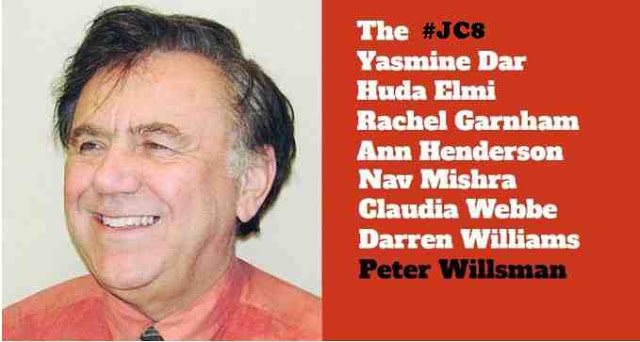It is Labour Friends of Israel and the Jewish Labour Movement who should apologise for:
I wrote this before I left for on vacation! I’m pleased to hear that in my absence Corbyn may finally be starting to understand that you don’t respond to attacks by mad dogs and Zionists by apologising but by going on the attack.
 |
| Instead of Corbyn apologising to the Zionists it is they who should be apologising for the killing, torture and imprisonment of children such as this |
was announced that Labour had taken a four point lead in the polls I joked on
Twitter that this meant that the false anti-Semitism allegations would start up
again. Almost on cue that is what
happened. ‘News’, if that is what it can
be called, emerged of an 8
year old meeting organised by the International Jewish Anti-Zionist
organisation. The meeting was chaired by Jeremy Corbyn. The guest speaker was the late Hajo Meyer who
compared the bombing and murder by Israel in Gaza to Nazi attacks on civilian populations.
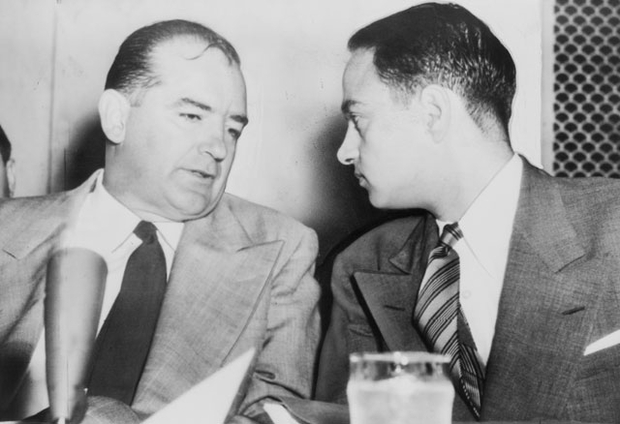 |
| Meet the author of Labour’s witchhunt of socialists – Senator Joe McCarthy |
assume he was advised to do so by Seamus Milne. If so Milne should resign as he
is clearly not up to the job. It doesn’t take many brain cells to work out that
apologising to your enemies weakens you not strengthens you. The goal of our
racist adversaries is not to secure an apology and move on but to remove Corbyn
as leader of the Labour Party.
apologising to your enemies weakens you not strengthens you. The goal of our
racist adversaries is not to secure an apology and move on but to remove Corbyn
as leader of the Labour Party.
emerged of John McDonnell, who has done his best to appease the Zionist lobby, telling
people he ‘weeped’
about the anti-Semitism that had sprung up in the Labour Party, having sponsored
the launch of the International Jewish Anti-Zionist Organisation in an EDM.
could just be coincidental. People just keep stumbling over meetings and events
that Corbyn and McDonnell used to speak at.
However there is another explanation.
Which is that a lot of work is going on, no doubt being funded
generouisly via the slush funds of the Israeli Embassy, into systematically
going through the records of everything that Corbyn and McDonnell have ever
done.
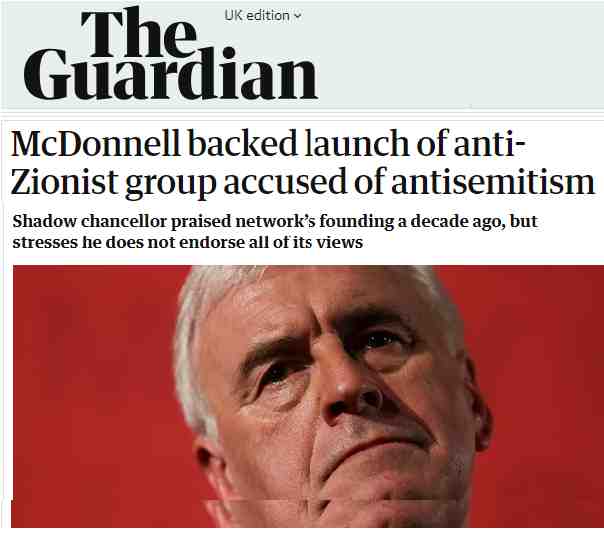
 |
| The Jewish Chronicle, edited by racist Stephen Pollard has nonetheless apologised to them |
 |
| However much McDonnell tries to row back on his past he is going to be condemened by the right-wing press so he should stop appeasing racist Zionists |
the Israeli Embassy, the Zionist Federation, the Community Security trust and Board
of Deputies copious files have been kept.
When I did a Subject Access Request of the CST I got back a file of over
300 pages, of events I had long forgotten. I could write my memoirs based on this stuff!
McDonnell defending their past
not running away from it. The Zionists are not interested in apologies
and none should be given. Corbyn did
over Israel what he did over South Africa which is to oppose the actions of an
Apartheid State.
acceptance of the IHRA was so damaging.
This bogus definition should never have been accepted. Britain’s delegate to the International
Holocaust Remembrance Alliance is none other than Sir Eric Pickles the former
Tory Cabinet Minister. Pickles is an out
and out racist.
the Tory link in the European parliament with the anti-Semitic Polish Law &
Justice Party and the far-right Latvian Fatherland and Freedom Party/LNNK (Nationalist
Alliance). They have one MEP, Robert Zile
who, every March goes on a walkabout around the centre of the capital Riga with
veterans of the Latvian SS. Even more
appallingly Pickles defended the Waffen SS.
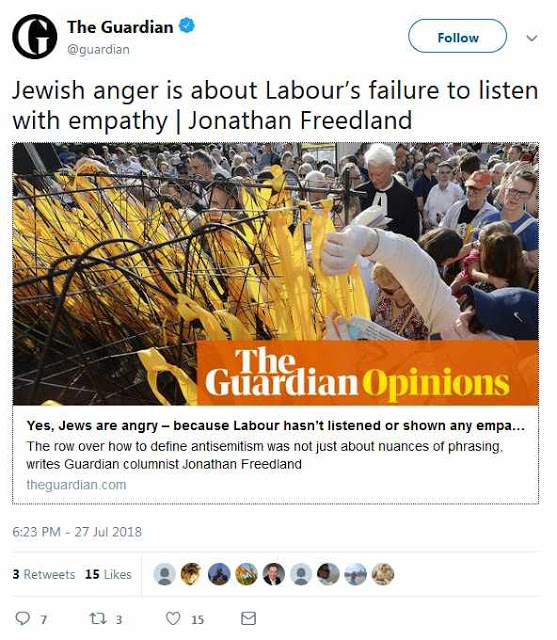 |
| Jonathan Freedland is not so much a journalist as a propagandist |
that the Latvian Waffen-SS were only conscripts fighting for their country, and
to say otherwise was a Soviet smear. Again, this misses the fact that a
substantial minority of the Latvian Waffen-SS were eager volunteers, including
veterans of pro-Nazi death squads who had already taken part in the first phase
of the Holocaust – and that should be enough to decide that those who march in
celebration of men who fought with Hitler, and against Britain and its allies,
are beyond the pale.’ [Once no self-respecting politician would have gone near
people such as Kaminski]
was the anti-Semitic MEP for Law & Justice Party whom the Tories
were allied with in the European Conservative Reform group yet he was defended
by none other than the Editor of the Jewish Chronicle, the far-Right Stephen
Pollard. Poland’s Kaminski is not an antisemite: he’s a
friend to Jews
Freedland and the Board of Deputies have forgotten about the Tories anti-Semitic
allies in the European parliament. They are more concerned with Corbyn and McDonnell’s
‘anti-Semitism’.
 |
| Even the Sun, the paper wot employed vile racist Katie Hopkins, is horrified by having a survivor of Auschwitz address a Holocaust Memorial Day meeting on remembering the lessons of the Holocaust |
brain, which is clearly half more than Seamus Milne or Corbyn’s advisers
possess, would realise that the aim of the Zionists and the Board of Deputies is
not to secure apologies but the resignation of Corbyn. Because they are worried
that McDonnell may step into his shoes they are also digging up dirt on him
too.
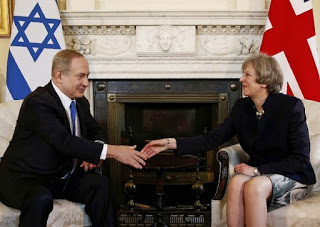 |
| Two peas in a pod – murderers both |
essential that Corbyn stops apologising and starts standing up to his
accusers. Secondly he takes a firm stand
that the IHRA definition of anti-Semitism, which he stupidly supported in the
wake of Theresa May’s adoption of this formula, is not allowed to suppress free
speech on Israel. Which means that the treacherous Lansman has to be confronted. See A
Vote for Jon Lansman is a Vote for the Right.
have spoken at meetings up and down the
country with a simple message. The witchhunt is not about me, Jackie Walker, Marc
Wadsworth or Ken Livingstone. It’s about Corbyn. Unfortunately Corbyn and his
advisers believed that they could appease the Board of Deputies, a ridiculous
organisation that represents nothing but a group of small businessmen and
synagogue goers. It doesn’t represent secular Jewry. If Corbyn had stood up to
these blackmailers 3 years ago they would have faded away. Instead he encouraged
them, pleaded with them and humiliated himself.
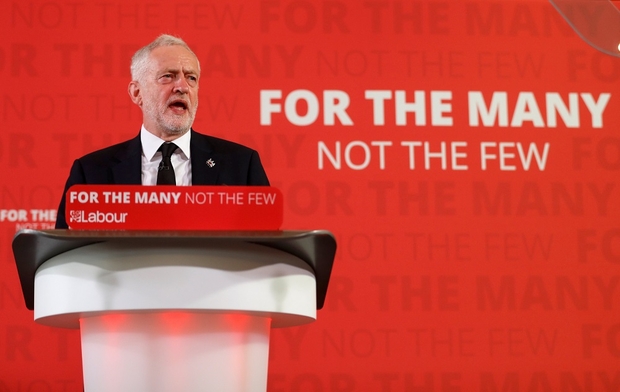 |
| In a disgusting example of Zionist antisemitism the Zionists changed this slogan to ‘For the many not the Jew’ |
now. Corbyn has conceded so much ground. However the first task is that
Corbyn and those around him recognise what the motives of his Zionist accusers
are. They are not concerned about anti-Semitism, which is a
historic low but the welfare of the State of Israel.
difficult given that he has made a rod for his own back. The first thing to do
is not to accept the advice of those
who are saying the IHRA must be accepted in its entirety. If necessary he must
appeal over the heads of Jon Lansman and Dave Prentis of UNISON. Prentis was
always a fair-weather friend.
Labour Party Avi Gabbay has brokenoff links with Corbyn. It is a sign that they
want Corbyn out hence they are refusing to deal with him. That is fine. It should
be the cue to disaffiliate what is the overseas wing of the ILP, the Jewish
Labour Movement which describes itself as the ILP’s ‘sister party’.
the USA have been aghast at the fact that a perceived enemy like Corbyn was
ever elected in the first place. It is unacceptable that an opponent of
American imperialism, who rejects NATO and is sympathetic to liberation
movements leads the second major party in Britain, the US’s closest ally. Israel is the US’s racist rottweiller in the Middle
East and it is clearly undertaking the task of removing a perceived enemy of
the US. It is this which Corbyn and
apparently Seamus Milne don’t understand. It is difficult to believe that Corbyn
and McDonnell haven’t had a strategy meeting to plan a response. Unbelievably that seems to be the case. It is the problem of reformism that it really
does believe that the state is neutral despite all the evidence to the contrary
(e.g. the bias of the BBC).
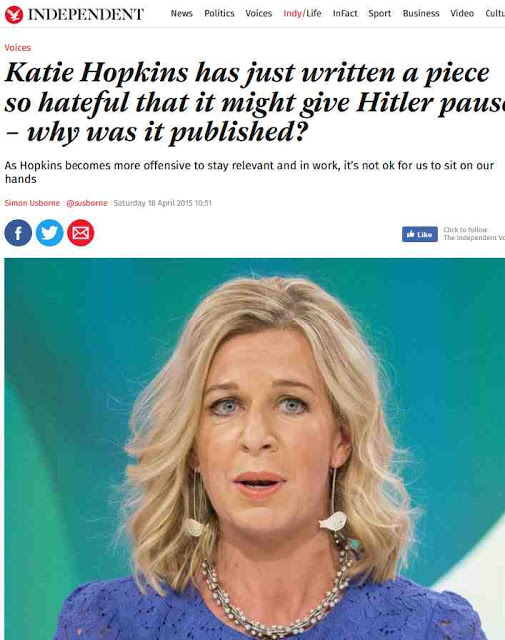 |
| Katie Hopkings – a strong supporter of the Zionists and a spokesman for antisemites everywhere |
is now. The opponents of Corbyn and
McDonnell will stop at nothing to prevent a Labour government. That means
saying no to the IHRA, saying no to Lansman and insisting that the members of
Momentum regain control of their organisation from the millionaire property
developer who is currently in charge.
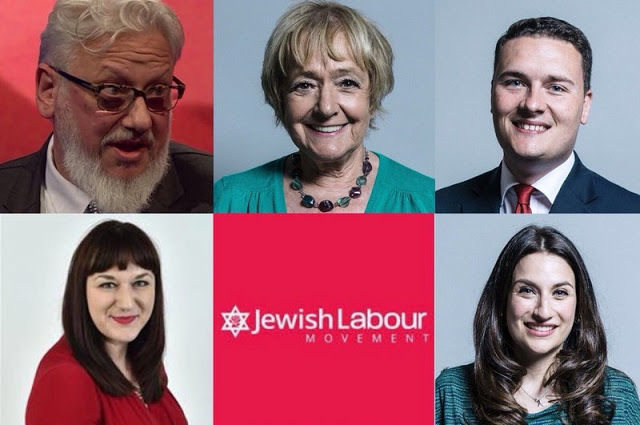 |
| This is a roll call of Corbyn haters |
links to some really good articles by Richard Silverstein and Asa Winstanley concerning
what is happening. I have also copied 2 really excellent articles by the legendary
Jewish folk singer Leon Rosselson and Media Lens.
agitate. The Left leadership of the Labour
Party is in peril as the representatives both of the British, American and Israeli
states are determined to prevent a radical reforming socialist government from
taking power in Britain.
Richard Silverstein’s The
Israel lobby is leading a witch hunt against Corbyn. It has to stop
Is
Labour’s Jon Lansman capitulating to the Israel lobby?, Asa Winstanley
The
Guardian hack, lies and distortions
children’s author. Here you will find provocative musings on songwriting,
politics and life’s little ironies. http://leonrosselson.co.uk
oppression, still our dream is peace
Theirs is the mask of hatred, ours the human face
Then let not our suffering turn our souls to ice
So that we do to strangers what was done to us.
Their bloody retribution I disown
Their songs of triumph I will never sing
For the god they worship turns them into stone.
hurt
Though they are Jews they do not live inside my heart.
Saturday 28 July (Jewish anger is about Labour’s failure to listen with
empathy) is a good example of the devious arguments and outright lies used
to defend the IHRA definition of antisemitism and the accusations being
levelled against Corbyn and the Labour Party.
Holocaust. This has no logical connection with his arguments but is designed to
soften you up. It’s a kind of emotional blackmail. Cynical? Perish the thought.
That Israel and its supporters have, since the war of 1967 when Israel began to
lose control of the narrative, exploited the Holocaust to give Israel victim
status and thus to shield it from criticism is a truism. Norman Finkelstein,
whose parents were Holocaust survivors, has written a book about it called The
Holocaust Industry. The former Labour MP, Gerald Kaufman, was excoriated for
saying: ‘The Israelis use the Holocaust: they use the murder of six million Jews
to justify their murder of thousands upon thousands of Palestinians’. The
accuracy of his observation, however, was not disputed.
to deflect attacks on Israel, actual Holocaust survivors can be more problematic.
Some of them have inconvenient views. Dr Hajo Meyer, who died in 2014, is now
at the centre of a media storm for having seen parallels between his own
experience at the hands of the Nazis and the crimes committed against
Palestinians under Israeli occupation. How odd that the mindless views of
Margaret Hodge and her abusive accusations are somehow sanctified by the fact
that some of her relatives were murdered by the Nazis while an actual Holocaust
survivor is vilified and his experience negated. Clearly the wrong sort of
Holocaust survivor.
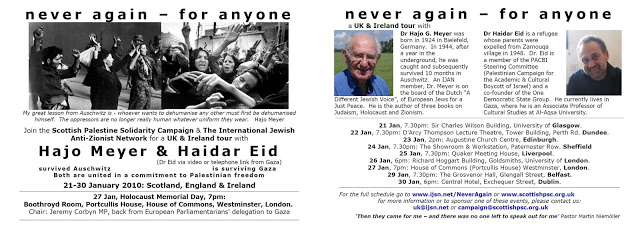 |
| The original flyers for Hajo Meyer’s meeting |
But
Dr Meyer is not alone. In March 2017, Marika Sherwood was due to give an open
talk at Manchester University entitled A Holocaust survivor’s story and the
Balfour Declaration: You’re doing to the Palestinians what the Nazis did to me.
She commented: ‘I was just speaking of my experience of what the Nazis did to
me as a Jewish child…. I can’t say I’m a Palestinian but my experiences as a
child are not dissimilar to what Palestinian children are experiencing now’.
After protests from the Israeli Embassy that this violated the IHRA definition,
the University insisted the subtitle be removed, that academics chosen to chair
the meeting should be replaced by university appointees and attendance limited
to university students and staff. And in August 2014, a letter signed by 40
Holocaust survivors — including Dr Meyer — and 287 of their descendants was
published in the NY Times. It condemned the massacre of Palestinians in Gaza
and called for a total boycott of Israel.
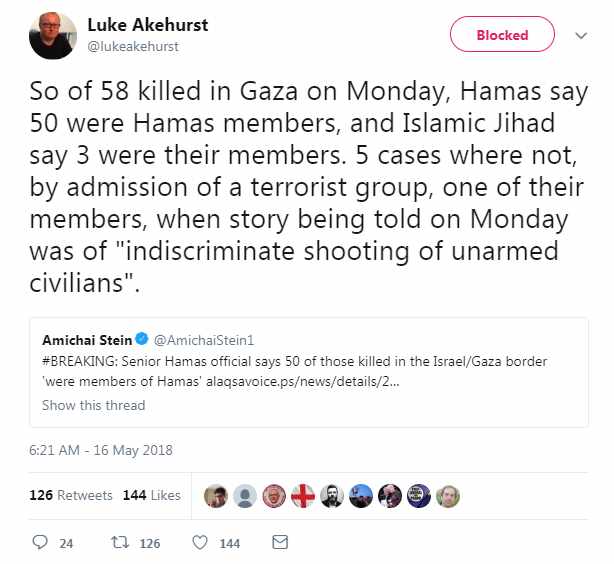 |
| Why has despicable racist Luke Akehurst, who justified Israel’s murder of unarmed Palestinians not been suspended for justifying murder? This animal has instead been allowed to stand for Labour’s NEC |
the consciousness of the Jewish community but the appalling treatment by Israel
of its Holocaust survivors is still a dirty secret. An estimated 60,000
survivors live below the poverty line in abysmal conditions. Germany has paid
to the Israeli government nearly 80 billion dollars as reparation to Jewish
survivors of Nazi persecution but much of that never reached individual
Holocaust survivors. A recent report revealed that 20,000 survivors in Israel
have never received the government support due to them.
report was a watershed moment. This was the first time in her life that she’d
heard an Israeli official claim any shred of responsibility or remorse on
behalf of the government. As one of the most outspoken critics of Israel’s
treatment of Holocaust survivors, Roth made headlines in 2013 when she
memorably shouted down members of a committee at a hearing in the Israeli
parliament.
receive money for the rest of our lives,” Roth demanded, in reference to
Israel’s first prime minister, David Ben-Gurion. “What have you done with the
money?” she screamed, pointing her finger at the seemingly unfazed politicians.
“Seeing a Holocaust survivor who can’t afford to heat his home in the winter
and can’t afford to buy food or medicine is your disgrace. I don’t care about
your committees. They mean nothing to us. I came all the way here to ask you
one thing: Let us die in dignity.”
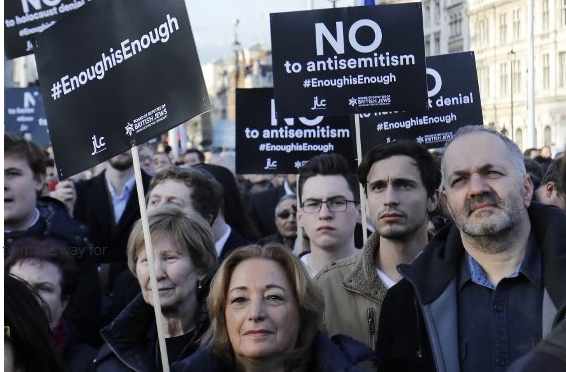 |
| On March 26th the Zionists held an ‘antiracist’ demonstration outside Parliament – it was attended by the racist Democratic Unionist Party MPs and even Norman Tebbit, author of the ‘cricket test’ |
Warsaw ghetto. She went on to Vilna, and then to the Stutthof concentration
camp, where her mother died of hunger and her sister was sent to the gas
chamber. She was 15 when the war ended, and she moved to Israel alone.
Echoing the accounts of other survivors, Roth said that when she arrived,
Israelis treated Holocaust survivors as if what happened to them was somehow their
fault. “I heard many times that we went like sheep to the slaughter,” Roth told
me. Yet, she continued, the Israeli government was happy to take money from the
German government for the suffering she and millions of others endured.
2006 observed that ‘it is better today to be a Holocaust survivor in the United
States or France, not to mention Germany, than to be one in Israel’. I look
forward to Freedland’s investigative article on this scandal.
Freedland embarks on a remarkable piece of obfuscation. You can’t, he says,
draw a clear line between ‘the idea of Israel and Zion and Jerusalem’ (which,
he says, is embedded in Jewish tradition) and the concrete reality, so that you
can’t hate Israel without showing hostility to Jews. This is nonsense. Pure
sophistry. It’s not a question of hating Israel but of holding it to account
for its crimes and you can certainly do that without showing any hostility to
Jews. In any case, the yearning for a return to Zion is a yearning for a home
somewhere over the rainbow which is not particular to Jews but is part of being
human. It has absolutely nothing to do with the Zionist state. Rabbinical law
forbids a return to the Holy Land until the messiah comes; political Zionism is
a secular ideology, not based on a religiously authorised return to Zion but on
the belief that antisemitism cannot be combatted and Jews do not belong in the
countries they have lived in over the centuries. Both Ben-Gurion and Theodore
Herzl were militantly anti-religious.
Jewish community, whoever they are, have had problems with the Labour Party for
a long time. “Churning inside are deep incomprehension and distrust brewed over
many years, if not decades.” What is he talking about? Is he suggesting that
under the arch Zionist and Israel lover Tony Blair, antisemitism was even then
rife in the Labour Party? How come then that the issue only emerged into the
open when Corbyn was elected leader? Just coincidence? Nothing to do with the
fact that Corbyn has been a campaigner for Palestinian rights. Of course not.
IHRA definition of antisemitism. The charge that the IHRA definition conflates
legitimate criticism of Israel with antisemitism ‘makes plenty of Jews want to
slam their heads on their desks in frustration’, he says. Well, I’m really
looking forward to seeing a display of synchronised head-banging by members of
the Jewish Labour Movement, orchestrated presumably by Mark Regev, because
that’s exactly what the definition does. That’s why 36 international Jewish
groups have rejected it and Liberty and two eminent lawyers have described it
as a threat to free speech. And, as Freedland will know, it has already been
used to close down discussion in universities and suspend Israel’s critics from
the Labour Party.
that if you criticise Israel the way you criticise other countries it ‘cannot
be regarded as antisemitic’. What the example actually says is: ‘criticism of
Israel similar to that levelled against any other country cannot be
regarded as antisemitic’. As I’ve pointed out, the italicised phrase puts
limits on what you can say in criticising Israel’s actions and policies. Israel
is a criminal state, a racist state, an apartheid state. At what point do those
appellations become antisemitic? And who is to decide? In any case, why is
Israel being given this special protection? No-one suggests that there should
be limits placed on criticism of, for example, Myanmar on the grounds that it
could be anti-Buddhist.
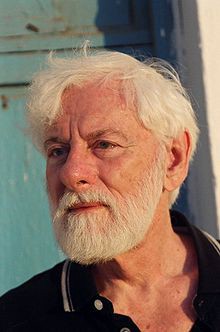 |
| Uri Avnery – veteran Israeli peace activist |
the IHRA, Freedland says, is ‘the one who wants to say Jews are disloyal to
their own countries, that Jews are Nazis and that the very idea of Jews having
a homeland of their own is ‘a racist endeavour.’ All those three examples are
distortions of what the IHRA definition actually says. There is nothing about
calling Jews Nazis. In any case, that would be covered by hate speech.The
example it actually gives is ‘Drawing comparisons of contemporary Israeli
policy to that of the Nazis’ which is exactly what Dr Meyer did and what other
Holocaust survivors have done. And what many Israelis have done. And there is
nothing antisemitic about that. If the parallels are there, why are we not
allowed to say so? Israel is a state. It has committed atrocities, not least in
the war of 1947/48. In December 1948, the Agricultural minister referred to
some of those atrocities as ‘Nazi acts’. He wasn’t being antisemitic. Hannah
Arendt compared the Nuremburg laws to Israel’s marriage laws. She wasn’t being
antisemitic. Recently the veteran Israeli journalist Uri Avnery compared the
way Israel’s population was being brainwashed with Nazi propaganda and the
dehumanisation of Palestinians with ‘the creation of Untermenschen in
the Nazi lexicon’. There is nothing antisemitic about that.
Uri
Avnery
antisemitism — ‘Denying the Jewish people their right to
self-determination , eg by claiming that a State of Israel is a racist
endeavour’ — is equally dishonest. He claims that it’s ‘the very idea of Jews
having a homeland of their own’ that is being protected by the definition, not
the actual state of Israel. What chutzpah! The example refers to a state not a
homeland or a ‘refuge’, a word he uses later on. The two are very different.
Many Jews — Martin Buber, Judas Magnes, Hannah Arendt, Albert Einstein — were
in favour of a homeland but vigorously opposed a Jewish state in Palestine, for
obvious reasons. And his emphasis on the word ‘a’ is absurd. It is clear that
the example refers to the actual state of Israel, not to some fictitious
entity, and that it is the existing racist state of Israel that the example is
trying to protect from being called racist.
dissembling, dishonest piece of special pleading that shames both Freedland and
the Guardian.
arguments. We have a government with a wafer thin majority lurching from
disaster to catastrophe, tearing itself to pieces over Brexit, failing dismally
in the face of crisis after crisis — the NHS, housing, immigration, the
railways, air pollution, education, Universal Credit — embarking on dangerous
and deluded policies — nuclear power, Trident renewal, fracking — . Surely one
concerted push would topple it into oblivion. So what is the Labour Party, the
supposed opposition, doing? It is arguing about definitions. This is insane.
And why is it doing this? Because the ‘Jewish community’ is unhappy that the
Labour Party hasn’t accepted the IHRA definition in full, or, at least ,
that is the pretext. So Corbyn concedes and Corbyn apologises and the more he
concedes and the more he apologises the weaker his position becomes and still
the pressure grows and the attacks continue because this is not really about
antisemitism and definitions but about getting rid of Corbyn or undermining him
to the point where he is powerless.
Bombing
of Gaza City 2014
community who were silent when Israel was gunning down unarmed civilians in
Gaza or, like the Board of Deputies, tried to justify it. They are the racists.
witness, raging against injustice and foregoing silence. It meant compassion,
tolerance and rescue. These were the ultimate Jewish values.
(Sara Roy, Senior Research Scholar at the Center for Middle Eastern Studies
at Harvard University and daughter of Holocaust survivors)
Israel
Is The Real Problem, Media Lens
Elite power cannot abide a serious challenge to its
established position. And that is what Labour under Jeremy Corbyn represents to
the Tory government, the corporate, financial and banking sectors, and the
‘mainstream’ media. The manufactured ‘antisemitism crisis’ is the last throw of
the dice for those desperate to prevent a progressive politician taking power
in the UK: someone who supports Palestinians and genuine peace in the Middle
East, a strong National Health Service and a secure Welfare State, a
properly-funded education system, and an economy in which people matter;
someone who rejects endless war and complicity with oppressive, war criminal
‘allies’, such as the United States, Saudi Arabia and Israel.
In a thoroughly-researched article,
writer and academic Gavin Lewis has mapped a deliberate pro-Israel campaign to
create a ‘moral panic’ around the issue of antisemitism. The strategy can be
traced all the way back to the horrendous Israeli bombardment of Gaza in the
summer of 2014. A UN report estimated that 2,252 Palestinians were killed,
around 65 per cent of them civilians. The death toll included 551 children.
There was global public revulsion at Israel’s war crimes and empathy with their
Palestinian victims. Support rose for the Boycott, Divestment, Sanctions
movement (BDS) which campaigns ‘to end international support for Israel’s
oppression of Palestinians and pressure Israel to comply with international
law’.
As Lewis observes, BDS came to be regarded more and more as
a ‘strategic threat’ by Israel, and a campaign was initiated in which Israel
and its supporters would be presented as the world’s real victims. In the UK,
the Campaign Against Antisemitism was established during the final month of
Israel’s 2014 bombardment of Gaza. Pro-Israel pressure groups began to bombard
media organisations with supposed statistics about an ‘antisemitism crisis’,
with few news organisations scrutinising the claims.
In particular, as we noted in a media
alert in April, antisemitism has been ‘weaponised’ to attack Corbyn and any
prospect of a progressive UK government critical of Israel. Around this time in
Gaza, there were weekly ‘Great March of Return’ protests, with people demanding
the right to reclaim ancestral homes in Israel. Many were mown down by Israeli
snipers on the border firing into Gaza, with several victims shot in the back
as they tried to flee. According
to the Palestinian Ministry of Health, a total of 155 Palestinians were killed
in the protests, including 23 children and 3 women. This is part of the brutal
ongoing reality for Palestinians.
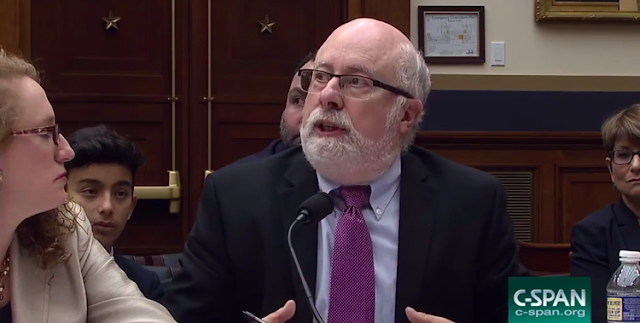 |
| Even Ken Stern, who drew up the IHRA definition, argues against its incorporation in the battle to suppress free speech |
Recently, much media attention has focused laser-like
on the International Holocaust Remembrance Alliance (IHRA) definition of
antisemitism, including 11 associated examples. Labour adopted 7 of these
examples, but dropped 4 because of their implication that criticism of Israel
was antisemitic. As George Wilmers noted
in a piece for Jewish Voice for Labour, Kenneth
Stern, the US Attorney who drafted the IHRA wording, has spoken out about the
misuse of the definition. It had:
‘originally been designed as a “working
definition” for the purpose of trying to standardise data collection about
the incidence of antisemitic hate crime in different countries. It had never
been intended that it be used as legal or regulatory device to curb academic or
political free speech. Yet that is how it has now come to be used.’
Examples of the curbing of free speech cited by Stern in written
testimony to the US Congress include Manchester and Bristol universities.
In an interview
on Sky News last weekend, one pro-Israeli commentator
stated openly that the aim is to push Corbyn out of public life. As The
Canary observed,
Jonathan Sacerdoti, a former spokesperson for the Campaign Against Antisemitism
(mentioned above) was:
‘clear that his motivation for wanting Corbyn gone is, in
part, opposition to his position on Israel.’
Lindsey German, national convenor of the Stop the War
Coalition, reminds
us of something crucial that the corporate media has been happy to downplay
or bury:
‘We should not forget either that the Israeli embassy was
implicated in interfering in British politics last year when one of its
diplomats was recorded as saying that he wanted to “bring down” a
pro-Palestine Tory MP, Alan Duncan. While he was sent back to Israel in
disgrace, the matter went no further – disgracefully given that this was blatant
interference in the British political system.’
In 2017, an Al Jazeera undercover sting
operation on key members of the Israel lobby in Britain had revealed
a £1 million plot by the Israeli government to undermine Corbyn.
German continued:
‘Are we seriously supposed to imagine that this was a maverick
operation, or that there is no other attempt to influence British politics,
especially when both Labour and Conservative Friends of Israel organisations
have strong links with the embassy? The present ambassador is Mark Regev, the
man who was press spokesman in 2009 when he defended the killing of
Palestinians through Operation Cast Lead, and who has defended the recent
killings of Gazan Palestinians by Israeli forces.’
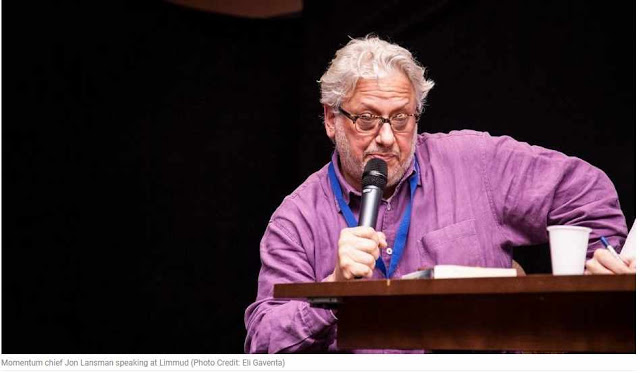 |
| Lansman, an arch-Zionist has destroyed Momentum’s democracy and is now lobbying for the IHRA |
For shared elite interests in Israel and the UK, there is
much at stake. Historian and foreign policy analyst Mark Curtis highlights
‘the raw truth’ rarely touched by the corporate news media:
‘The UK’s relationship with Israel is special in at least
nine areas, including arms sales, air force, nuclear deployment, navy,
intelligence and trade, to name but a few.’
Indeed, arms exports and trade are increasingly profitable
to British corporations doing business with Israel. Moreover, senior government
ministers have emphasised that the UK-Israel relationship is the ‘cornerstone
of so much of what we do in the Middle East’ and that ‘Israel is an important
strategic partner for the UK’. As Curtis notes:
‘The Palestinians are the expendable unpeople in this
deepening special relationship.’
A Shameful Outburst
Corbyn’s life, trying to find past incidents they can highlight as ‘support’
for the ludicrous and cynical claim that he is ‘soft’ on antisemitism or even
himself antisemitic. Hence the manufactured controversy
of Corbyn hosting an event in 2010 during which Auschwitz survivor Hajo Meyer
compared Israel’s behaviour to that of Nazi Germany.
An Independent editorial,
titled ‘Corbyn has been found wanting on antisemitism – now he must act’, asserted
that he was ‘a fool to lend his name to this stunt’. It was:
‘such an egregious error of judgement that Jeremy Corbyn,
an extraordinarily stubborn man, has had to apologise for it.’
Under a photograph of Corbyn sitting at the 2010 meeting
with Meyer, Times political correspondent Henry Zeffman said
that:
‘Corbyn has led Labour into a nightmare of his own making.
The veteran left-winger will never recant the views on Israel that he formed
over decades in the political wilderness.’
In the Daily Mail, the caption
to the same 2010 photograph of Corbyn sitting with Meyer led with the word,
‘Offensive’.
And on and on it went in the ‘mainstream’ media.
Adri Nieuwhof, a Netherlands-based human rights advocate
and former anti-apartheid activist, was a friend of Meyer, who died in 2014. In
an article for Electronic Intifada, she wrote:
‘The 2010 Holocaust Memorial Day event took place the year
after an Israeli assault on Gaza [Operation Cast Lead] that killed more than
1,400 Palestinians and injured thousands more.
‘Meyer was very upset by the assault because Palestinians
were trapped in Gaza due to the blockade on the territory that Israel imposed
starting in 2007.
‘He could not help but compare the situation of
Palestinians trapped under Israeli occupation and bombardment with Jews caged
by the Nazis in ghettos like the Warsaw Ghetto.’
She added:
‘Those attacking Corbyn today have no restraint and no
shame. They will even call a man who survived Auschwitz and lost his parents in
the Holocaust an anti-Semite if they believe that is what it takes to shield
Israel from consequences for its crimes.’
Nasty abuse flung at the Labour leader has even come from
supposed colleagues. Last month, rightwing Labour MP Margaret Hodge called
Jeremy Corbyn ‘a fucking anti-Semite and a racist’. The corporate media
gleefully lapped up her outburst – the Guardian moved
swiftly to grant her space to declare
Labour ‘a hostile environment for Jews’ – and stoked the ‘Labour antisemitism row’ for weeks
afterwards, with over 500 articles to date according to our ProQuest newspaper
database search.
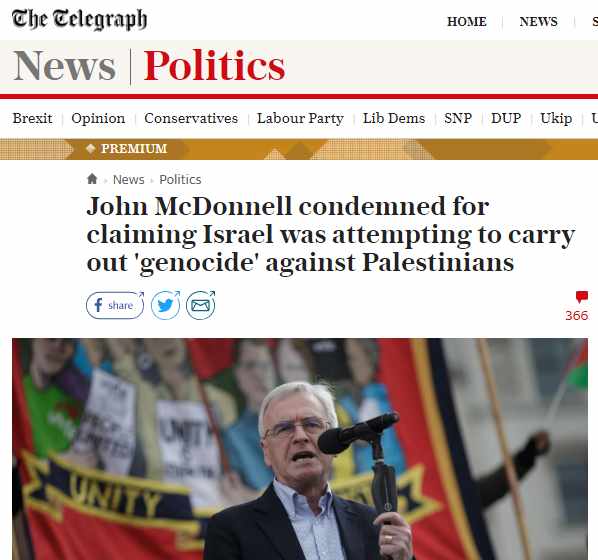 |
| McDonnell is now being subject to the same treatment as Corbyn despite kissing Zionist feet |
letter
of complaint to the BBC, condemning a ‘lack of impartiality and
inaccuracies’ in its reporting of Hodge’s allegations against Corbyn. Her
accusations were ‘repeated numerous times without denial or opposing views’ by
BBC News. Moreover, Hodge’s assertion that she represents the entire ‘Jewish
community’ has been allowed to pass unchallenged.
Trashing A Dedicated Anti-Racist
News, Jewish Chronicle and Jewish
Telegraph – all carried the same
front page on ‘the community’s anger over Labour’s anti-Semitism row’. They
had taken this unprecedented step because of:
‘the existential threat to Jewish life in this country that
would be posed by a Jeremy Corbyn-led government. We do so because the party
that was, until recently, the natural home for our community has seen its
values and integrity eroded by Corbynite contempt for Jews and Israel.’
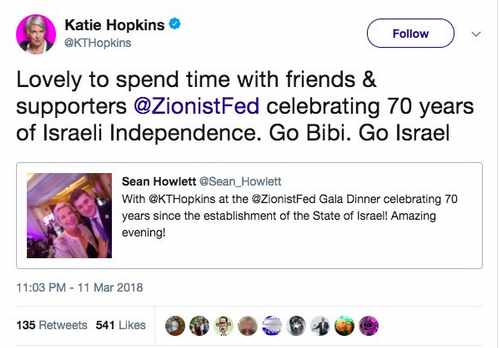 |
| It is touching to know that vile racist bigot has secured a job on The Torygraph |
These outrageous claims were rejected by Stephen Oryszczuk,
foreign editor of Jewish News. He told
The Canary:
‘It’s repulsive. This is a dedicated anti-racist we’re
trashing. I just don’t buy into it at all.’
He made three vital points:
1) Jeremy Corbyn is not an antisemite, and the Labour Party
does not represent an ‘existential threat’ to Jewish people
2) The International Holocaust Remembrance Alliance’s (IHRA) definition of
antisemitism threatens free speech, and Labour was right to make amendments
3) The ‘mainstream’ Jewish media is failing to represent the diversity of
Jewish opinion
The corporate news media itself is undoubtedly ‘failing to
represent the diversity of Jewish opinion’. Worse, it has, in fact, been a willing
accomplice in promoting and amplifying the pro-Israel narrative of a
‘Labour antisemitism crisis’. Consider a recent powerful piece by
Manchester Jewish Action for Palestine, published in Mondoweiss:
‘As Jewish people in Manchester, England, we resent the
despicable racism shown towards the Palestinians by Guardian
stalwarts such as Jonathan Freedland, Polly Toynbee, Jessica Elgott, Eddie
Izzard, Nick Cohen, Marina Hyde and Gaby Hinsliff among others, all saturating
comment sections on mainstream news websites with attacks designed to bring
down the UK Labour Party leader Jeremy Corbyn, and to protect Israel from
accountability.’
 |
| Labour Friends of Israel and the Jewish Labour Movement should apologise for this |
They added:
‘UK commentators take the morally defunct option of backing
right wing mainstream Zionist organisations’ outrageous cries of
“anti-Semitism” the moment Corbyn’s Labour get ahead in the polls, or
the moment there is a risk of serious public condemnation of Israel’s horrific
crimes against the Palestinians.’
The article continued:
‘Why were Palestinians not consulted on the whole debate
about Israel and anti-Semitism, when they are the people being slowly squeezed
out of existence by Israel? Where are the Palestinian voices in the Guardian?’
Where indeed?
‘We, as Jews, will not mindlessly pretend that protecting
the Jewish people and protecting Israel are the same thing, on the hopeless
say-so of a crew of establishment hacks at the Guardian.’
The Manchester-based Jewish group singled out one prominent
Guardian columnist, and former comment editor, for
particularly heavy criticism:
‘Jonathan Freedland, one of the UK’s most effective
propagandists for Israel, while giving Palestinians occasional lip service so
he and the other liberal elitists can make doubtful claims to
“impartiality”, has been the most relentless in his attacks on
Corbyn. Freedland routinely uses his opinion editorial position in the Guardian
to do more than most to “strong-arm” the Labour Party into backing
the whole IHRA definition, flawed examples and all. It is unsurprising that he
would push for the guideline, “claiming that the existence of a State of
Israel is a racist endeavour” to be included as anti-Semitic trope, given
he is on record excusing the crime against humanity that was Israel’s
foundational act – the ethnic cleansing of the Palestinian population in
1947/1948.’
One of Freedland’s Guardian articles
that the group must have had in mind was published last month under the title, ‘Yes,
Jews are angry – because Labour hasn’t listened or shown any empathy’. Leon
Rosselson, a children’s author and singer-songwriter whose Jewish parents were
refugees from Tsarist Russia, argued
that the article:
‘is a devious, dissembling, dishonest piece of special
pleading that shames both Freedland and the Guardian.’
Earlier this month, Corbyn himself had a piece
in the Guardian in which he wrote:
‘I do acknowledge there is a real problem [of antisemitism]
that Labour is working to overcome. […] We were too slow in processing
disciplinary cases of antisemitic abuse, mostly online, by party members. And
we haven’t done enough to foster deeper understanding of antisemitism among
members.’
A Telegraph editorial
typified the corporate media’s reaction to Corbyn’s article:
‘he respond[ed] with Soviet-esque institutional lethargy…
just the latest in a long line of obfuscations that betray a central fact:
Labour’s leader is unhealthily obsessed with Israel, and tainted by association
with fanatics.’
Corbyn cannot do anything right in the eyes of the
corporate media. As Rosselson said:
‘Corbyn concedes and Corbyn apologises and the more he
concedes and the more he apologises the weaker his position becomes and still
the pressure grows and the attacks continue because this is not really about
antisemitism and definitions but about getting rid of Corbyn or undermining him
to the point where he is powerless.’
Sadly, the Labour leader has failed to properly address
this relentless and vicious campaign, focusing instead on trying to fend off
accusations of antisemitism. By sticking within this narrative framework set up
by the powerful Israeli lobby, a twisted framework that can only be maintained
with corporate media connivance, he and his colleagues have made a serious
mistake. Asa Winstanley put
it bluntly back in March:
‘Jeremy Corbyn must stop pandering to Labour’s Israel
lobby.’
Winstanley pointed out that the campaign has been going on
for years, and he expanded:
‘Too many on the left seem to think: if we throw them a
bone by sacrificing a few token “extremists,” the anti-Semitism story
will die down and we can move on to the real business of electing a Labour
government.
‘But years later, Labour is still being beaten with the
same stick.
‘Any close observer of Israel and its lobby groups knows
this: they cannot be appeased.’
Other commentators have made the same point. An OffGuardian
article
in April, titled ‘Corbyn should learn his lesson: compromise with the devil
is not an option’, observed:
‘Corbyn seems to think a few little compromises will get
him accepted in the mainstream media. It pains me to say it, but this is
fundamentally untrue. You can’t compromise with someone who wants nothing but
your total destruction. Hopefully Corbyn has learned this lesson by now.’
Sadly not, it appears. A Morning Star editorial
correctly observes that Corbyn and his advisers:
‘fail to appreciate the ruthlessness of his opponents or
the unrelenting nature of their goals.’
Earlier this week, Winstanley published an article
revealing yet another element of Israel’s intense campaign against Corbyn:
the use of an app to promote propaganda messages via social media accusing
Corbyn of antisemitism. The app is a product of Israel’s strategic affairs
ministry which ‘directs Israel’s covert efforts to sabotage the Palestine
solidarity movement around the world.’
As Jonathan Cook cogently explains
on his website:
‘Labour is not suffering from an “anti-semitism
crisis”; it is mired in an “Israel crisis”.’
To those who bemoan that Corbyn and his team are not
sufficiently ‘media-savvy’, that he has not done enough to present himself as
‘PM material’ via the press and television, David Traynier has written a strong
rebuttal.
Two essential facts need to be understood, he says: first, the corporate media
‘filter’ and distort the news as described by Edward Herman and Noam Chomsky in
their ‘propaganda model’
of the media, introduced in ‘Manufacturing Consent’. Second, journalists and
editors are themselves subjected to a ‘filtering’ process as they rise up the
career ladder. They are selected for positions of ever-increasing
responsibility only if they have demonstrated to corporate media owners,
managers and senior editors that they can be trusted to say and do the ‘right’
things; even think the ‘right thoughts’. As Chomsky famously said to Andrew Marr,
then the young political editor of the Independent and
now with the BBC:
‘I’m sure you believe everything you’re saying. But what
I’m saying is that if you believed something different, you wouldn’t be sitting
where you’re sitting.’
In short, says Traynier:
‘the idea that a socialist party simply needs to manage the
press better is a nonsense. The corporate media is not there to be won over, it
can’t be “managed” into giving Corbyn a fair hearing. In fact, once
one understands how the media works, the burden of proof would rest with anyone
those who claimed that it wouldn’t be biased against Corbyn.’
Despite the intense campaign against Corbyn – and perhaps,
in part, because of its obviously cynical and manipulative
nature – many people are perceptive enough to see what is going on. Israel is
the real problem.
Cook’s 8 August
2018
is not in the places where the British corporate media have been directing our
attention. What can be said with even more certainty is that there is rampant
hatred expressed towards Jews in the same British media that is currently
decrying the supposed anti-semitism of Labour leader Jeremy Corbyn.
reporter in Israel over nearly two decades. I offer it in case it helps to
resolve the confusion felt by some still pondering the endless reports of
Labour’s supposed anti-semitism “crisis”.
most violent phase of Israel’s suppression of the Palestinians’ second
intifada, I desperately tried to make sense of the events raging around me.
Like most new reporters, I searched for experts – at that time, mostly leftwing
Israeli analysts and academics. But the more I listened, the less I understood.
I felt like a ball in a pinball machine, bounced from one hair-trigger to the
next.
chosen to locate myself in Nazareth, the largest Palestinian city in Israel,
rather than in a Jewish area or in the occupied territories. The conflict
between Israelis and Palestinians seemed much more complex when viewed through
the prism of Palestinian “citizens” living inside a self-declared Jewish state.
unequivocally and in ways it was difficult not to admire, given the morass of
anti-Palestinian sentiment and self-righteousness into which the rest of
Israeli society was rapidly sinking. But each time I latched on to such an
Israeli in the hope of deepening my own understanding, something they said
would knock me sideways.
self-evidently bogus liberal democratic credentials of a Jewish state, one that
I could see from my location in Nazareth was structurally organised to deny
equal rights to its Palestinian citizens. Or the experts would echo the Israeli
government’s inciteful claims that this largely quiescent Palestinian minority
in Israel – a fifth of the population – was at best a demographic threat to the
Jewish majority, and at worst a Trojan horse secretly working to destroy the
Jewish state from within.
experts eschewed, they readily flaunted when discussing Palestinians inside
Israel. Were they really leftists or covert ethnic chauvinists?
was only possible when I factored in the Israeli state’s official ideology:
Zionism.
them – saw the conflict exclusively through the colonial prism of their own
ethnic privilege. They didn’t much care for Palestinians or their rights. Their
opposition to the occupation was barely related to the tangible harm it did to
the Palestinian population.
brutalised and corrupted Israeli Jewish society, seeping into its pores like a
toxin. Or they wanted the occupation to end because the combined populations of
Palestinians in “Greater Israel” – in the occupied territories and inside
Israel – would soon outnumber Jews, leading, they feared, to comparisons with
apartheid South Africa. They wanted Israel out of all or most of the occupied
territories, cutting off these areas like a gangrenous limb threatening the
rest of the body’s health.
opposition to the occupation rooted in a respect for the rights and dignity of
the Palestinians in the territories. And because their position was an ethical,
rights-based one, rather than motivated by opportunism and self-interest, these
anti-Zionist Jews also cared about ending discrimination against the one in
five Israeli citizens who were Palestinian. Unlike my experts, they were
morally consistent.
should never assume that, because someone has adopted a moral position you
share, their view is based on the moral principles that led you to adopt that
position. The motives of those you stand alongside can be very different from
your own. People can express a morally sound view for morally dubious, or even
outright immoral, reasons. If you ally yourself with such people, you will
invariably be disappointed or betrayed.
Palestinians may in fact be cover for other ways of oppressing them.
“crisis” in Labour. Anti-semitism, like all racisms, is to be denounced. But
not all denunciations of it are what they seem. And not all professions of
support for Palestinians should be taken at face value.
instinctively recoil from criticising a Jew who is highlighting anti-semitism.
It is that insulation from criticism, that protective shield, that encouraged
Labour MP Margaret Hodge recently to publicly launch a verbal assault on Corbyn, vilifying him, against all
evidence, as an “anti-semite and racist”.
surely beyond doubt that her actions brought the party “into disrepute” – in
this case, in a flagrant manner hard to imagine being equalled. This is the
same party, remember, that recently expelled Marc Wadsworth, a prominent black anti-racism
activist, on precisely those grounds after he accused Jewish Labour MP Ruth
Smeeth of colluding with rightwing newspapers to undermine Corbyn.
that it decided that an activist (Wadsworth) denigrating a Labour MP (Smeeth)
was more damaging to the party’s reputation than a Labour MP (Hodge) vilifying
the party’s leader (Corbyn). In this twisted set of priorities, a suspicion of
possible racism towards a Jewish MP served to justify actual racism against a
black party activist.
events have proven that party officials have decisively prioritised the rights
of diehard supporters of Israel among British Jewry to defend Israel at all
costs over the right of others, including Jews, to speak out about the
continuing brutalisation of Palestinians by Israel’s occupation regime.
entitled to the benefit of the doubt – that they truly fear anti-semitism is on
the rise in the Labour party – had they not repeatedly indulged in the kind of
anti-semitism they themselves have deplored.
MPs – and the fervently pro-Israel lobby groups behind them like the Jewish
Labour Movement – intentionally gloss over the fact that many of the prominent
activists who have been investigated, suspended or expelled for anti-semitism
in recent months – fuelling the claim of a “crisis” – are in fact Jewish.
Louise Ellman more important than those of Moshe Machover, Tony Greenstein,
Cyril Chilson, Jackie Walker or Glyn Secker – all Labour activists who have
found their sensitivities, as Jews opposing the abuse of Palestinians, count
for little or nothing among Labour officials? Why must we tiptoe around Hodge
because she is Jewish, ignoring her bullygirl tactics to promote her political
agenda in defence of Israel, but crack down on Greenstein and Chilson, even
though they are Jewish, to silence their voices in defence of the rights of
Palestinians?
John Mann have stoked the anti-semitic predilections of the British media,
which has been only too ready to indict “bad Jews” while extolling “good Jews”.
the fire that such Labour MPs had intentionally fuelled. He joined Jewdas, a
satirical leftwing Jewish group that is critical of Israel, for a Passover
meal. He was roundly condemned for the move.
like the Board of Deputies and by the British corporate media as the “wrong
kind of Jews”, or even as not “real” Jews. In the view of the Board and the media,
Corbyn was tainted by his association with them.
kneel before Israel. Ignore Corbyn for a moment. Did Labour MPs Hodge, Ellman
or Smeeth speak out in the defence of fellow Jews under attack over their
Jewishness? No, they did not.
“anti-semites” for their full-throated condemnations of Israel’s institutional
racism, why are Hodge and Ellman not equally anti-semites for their collusion
in the vilification of supposedly “bad” or “phoney” Jews like Jewdas,
Greenstein and Chilson.
respecting Jewish sensitivities or even about Jewish identity. It is about
protecting the sensitivities of some Jews on Israel, a state oppressing and
dispossessing the Palestinian people.
Israel, and that to attack Israel is to attack him personally, he is demanding
the exclusive right to police the parameters of discussions about Israel. He is
asserting his right, over the rights of other Jews – and, of course,
Palestinians – to determine what the boundaries of political discourse on
Israel are, and where the red lines denoting anti-semitism are drawn.
the centre of another confected anti-semitism row in the Labour party: over the
International Holocaust Remembrance Alliance’s definition of anti-semitism and
an associated set of examples. They want all the IHRA’s examples adopted by Labour, not
just most of them.
variations of the simple formulation: “Anti-semitism is the hatred of Jews for
being Jews.” But the IHRA takes this clear definition and muddies it to the
point that all sorts of political debates can be viewed as potentially
anti-semitic, as leading jurists have warned (see here
and here).
examples of anti-semitism relate to Israel – a nuclear-armed state now
constitutionally designed to privilege Jews over non-Jews inside its recognised
borders and engaged in a half-century of brutal military occupation of the
Palestinian people outside its borders.
supposed only to be treated as potentially anti-semitic, depending
on the context. That is the express view of the definition’s drafter, Kenneth
Stern, a Jewish lawyer, who has warned that the guidelines are being perverted to silence criticism of Israel and stifle free
speech.
People like Jonathan Freedland and Margaret Hodge, cheered on by large swaths
of Labour MPs, who have strongly implied that Corbyn and his allies in the
party are anti-semitic for sharing Stern’s concerns.
setting the IHRA guidelines in stone, as the unchallengeable, definitive new
definition of anti-semitism. That will relieve them of the arduous task of
policing those discourse boundaries on the basis of evidence and of context.
They will have a ready-made, one-size-fits-all definition to foreclose almost
all serious debate about Israel.
citizens constitutionally guaranteed rights denied to non-Jewish citizens, is
proof of the institutional racism on which political Zionism is premised and
that was enshrined in the founding principles of the state of Israel? Well, you
just violated one of the IHRA guidelines by arguing that Israel is a “racist
endeavour”. If Freedland and Hodge get their way, you would be certain to be
declared an anti-semite and expelled from the Labour party.
is, one only has to inspect the faux-outrage over the latest “anti-semitism
crisis” involving Corbyn. He has been forced to make a grovelling apology – one that deeply discredits him – for
hosting an anti-racism conference in 2010 at which a speaker made a comparison
between Israel’s treatment of Palestinians and the Nazis’ treatment of Jews.
That violated another of the IHRA examples.
highlight is that the speaker given a platform at the conference was the late Hajo Meyer, a Jewish Holocaust survivor who dedicated his
later years to supporting Palestinian rights. Who, if not Meyer, deserved the
right to make such a comparison? And to imply that he was an anti-semite
because he prioritised Palestinian rights over the preservation of Israel’s
privileges for Jews is truly contemptible.
the behaviour of Jewish critics of Israel like Greenstein and Chilson, who have
been expelled from the Labour party. To intentionally exploit and vilify a
Holocaust survivor for cheap, short-term political advantage – in an attempt to
damage Corbyn – is malevolence of the worst kind.
others have actively sought to obscure the wider context in which it must be
judged – as, in large part, a painful debate raging inside the Jewish
community. It is a debate between fervently pro-Israel Jewish establishment
groups and a growing body of marginalised anti-Zionist Jewish activists who
wish to show solidarity with the Palestinians. Labour is not suffering from an
“anti-semitism crisis”; it is mired in an “Israel crisis”.
and many others, Freedland and Hodge have shown that they do not really care about
the safety or sensitivities of Jews. What they chiefly care about is protecting
their chosen cause of Israel, and crippling the chances of a committed
supporter of Palestinian rights from ever reaching power. They are prepared to
sacrifice other Jews, even victims of the Holocaust, as well as the Labour
party itself, for that kind of political gain.
only ones who have the right to a voice and to sensitivities. They are wrong.
racism towards Palestinians by flaunting their self-serving anti-occupation
credentials. Under the cover of concerns about anti-semitism, Freedland and
Hodge have helped stoke hatred – either explicitly or through their silence –
towards the “wrong kind of Jews”, towards Jews whose critical views of Israel
they fear.
allow a debate to flourish within Britain’s Jewish community and within the
Labour party. They could admit that not only is there no evidence that Corbyn
is racist, but that he has clearly been committed to fighting racism all his
life.
Stephen Oryszczuk, foreign editor of the Corbyn-hating Jewish News. His
newspaper was one of three Jewish weeklies that recently published the same front-page editorial claiming that
Corbyn was an “existential threat” to British Jews.
behaviour of his own newspaper. In an interview, he observed of this campaign to vilify Corbyn:
“It’s repulsive. This is a dedicated anti-racist we’re trashing. I just don’t
buy into it at all.” He added of Corbyn: “I don’t believe he’s antisemitic, nor
do most reasonable people. He’s anti-Israel and that’s not the same.”
that these individuals were “certainly out to get him [Corbyn]”. Unlike
Freedland and Hodge, he was also prepared to admit that some voices in the
Jewish community were being actively silenced: “It’s partly our fault, in the
mainstream Jewish media. We could – and arguably should – have done a better
job at giving a voice to Jews who think differently, for which I personally
feel a little ashamed. … On Israel today, what you hear publicly tends to be
very uniform.”
the Labour party, in the Jewish community, and in wider British society.
of the others, please consider hitting the donate button to the right.
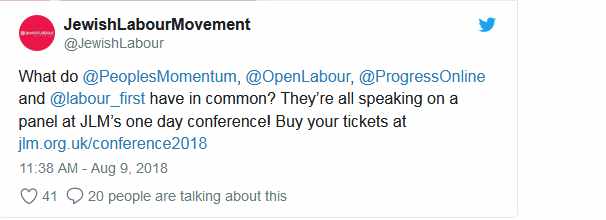 |
| Despite being involved in the witchhunt of Corbyn both Owen Jones and Jon Lansman have agreed to speak on the platform of Apartheid Israel |
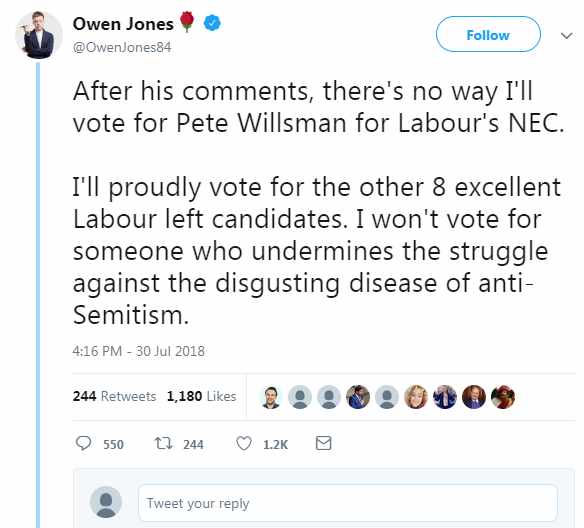 |
| Let’s make airhead Owen Jones have a horrible day by supporting Pete Willsman |
role of the enemy of the Corbyn leadership in the Labour Party. A typical
examle of an article from this poisonous home for the Labour Right is the
following vacuous nonsense. Even its title is a give away – it assumes
that the Labour Party has ever had the trust, whatever that means, of British
Jews. British Jews haven’t voted in their majority for the Labour Party
since the 1950’s with the possible exception of the Blair era. Why?
Because they have moved upwards socially. It certainly didn’t begin with
Corbyn. Exactly the same complaints were made about Ed Miliband. See for
example The Spectator’s How Ed Miliband
lost the Jewish vote
How
did Labour lose the trust of Britain’s Jews? New Statesman
Arguably, Labour’s
current malaise began not with Corbyn, but his predecessor, Ed Miliband.
“How
did we get here?” That is the question is on the lips of Labour MPs,
councillors, members, and voters this summer. As the party’s anti-Semitism
crisis deepens, seemingly inexorably, it is asked with increasing anguish and
despair.
How
did an officially anti-racist party – a mantle which, despite the ignominy
of recent months, its warring factions still cling to – come to be feared
and loathed by swathes of Britain’s Jewish community?
How
did it become the subject of anti-racism protests in Parliament Square,
rather than their natural leader? How did Labour MPs reach the point where they
are prepared to argue that their party is no longer an anti-racist one?
And
how did the prospect of its return to government become so foreboding that
it was labelled an “existential threat” to British Jews by
the community’s three biggest newspapers?
Most
commentators alight on a simple answer: Jeremy Corbyn. Since his implausible
election in 2015, the Labour leader has developed a knack for defying political
gravity, for confounding expectations, for taking his party where it has never
gone before. So it is with anti-Semitism.
Under
Corbyn, Labour has defied expectation in a singularly unedifying way.
Anti-Semitism
has always found a happy home on the fringes of the left, where
anti-imperialism meets conspiracy. Labour’s leftward tack after Corbyn was
elected as leader saw its membership swell to over half a million. Almost
overnight, those fringes were subsumed by the mainstream. It is often said that
Labour’s transformation into a mass movement, inspired by Corbyn, has
transformed its finances and campaigning power. But an influx of members whose
prejudices for so long went unchecked in little-read pamphlets and
poorly-attended meetings has been just as significant.
Even
a non-exhaustive list of controversies makes for grim reading. The 2016
Chakrabarti Report into anti-Semitism within Labour merely gave critics
more ammunition: it was dismissed as a whitewash and discredited when its
“independent” author, the human rights activist Shami Chakrabarti,
was handed a peerage by Labour soon after.
In
2017, Ken Livingstone, the former London Mayor, avoided expulsion for
comments in which he suggested that Adolf Hitler “had been a Zionist before he
went mad and killed six million Jews”. This March, it was discovered that
Corbyn, before his election as leader, had defended the existence of a
mural depicting hook-nosed bankers playing Monopoly on the backs of the world’s
poor (he
has since expressed his regret for doing so; a spokesperson said
he had initially objected to its removal on the grounds of free speech).
In
attempting to mitigate the impact of these controversies and the individual
cases of grassroots anti-Semitism that have punctuated them, Labour has merely
sunk deeper into a toxic mire. There is no visible escape. Its well-intentioned
but misjudged attempts to find a way to draw out the poison have made
things worse, like
its failure to adopt the full International Holocaust Remembrance Association
definition of anti-Semitism in its new code of conduct. Far from repairing
its relationship with the Jewish community, it has merely pushed the party
close to the point of no return.
Indeed,
British Jewry – whose internal divisions, diversity, and differences of
cultural, political and religious opinion are far more numerous and significant
than the divided left’s – has been united to a degree that would have once been
dismissed as impossible. Their community is not, and has never been, a
homogenous bloc (although on some issues, like the right of Israel to exist,
they are overwhelmingly
united). Last month, 68 rabbis overcame such small differences, such as not
believing one another to be rabbis, to accuse Labour of ignoring the community
over the IHRA definition. Britain’s three biggest Jewish newspapers followed
with an unprecedented joint front-page editorial, which spoke of “the
existential threat to Jewish life in this country that would be posed by a
Jeremy Corbyn-led government”.
At
Westminster, the impact has been just as corrosive. The uneasy truce
between the leadership and the vast majority of MPs – tacitly brokered in the
wake of last year’s election – has broken down. The Parliamentary Labour Party
has voted, in defiance of the party’s ruling national executive, to adopt the
full IHRA definition.
Some
of them have almost literally come to blows with the party leadership. One row,
first
reported in the New
Statesman, saw arch-Corbynsceptic Ian Austin allegedly brand Ian
Lavery, Labour’s chair, a “fucking bastard” and “wanker” over the party’s
handling of anti-Semitism in the division lobby. Corbyn himself was accused of
being an “anti-Semite and a racist” behind the Speaker’s chair in the Commons
chamber by Margaret Hodge, the veteran Jewish MP. Both are now subject to
internal party investigations.
Members
of the shadow cabinet and Labour staff are exasperated. Most strikingly,
the leader and his closest and oldest political ally, John McDonnell, are
singing from different hymn sheets – this week, the shadow chancellor has been
markedly more forthcoming and trenchant in his criticism of Labour’s
handling of the saga than his leader (he has denied they are anything but
united). Some fear the damage has already been done: several council seats, most
notably in Barnet, North London, have fallen amid the controversy.
Pessimistic
party sources predict whatever Labour does on anti-Semitism will be too
little, too late. Those tasked with defending the party do so with increasing
resignation. For many, anti-Semitism is as the front page of this week’s Jewish
News describes it: “The nightmare that never ends.”
Labour’s
running sore is festering. Corbyn has failed to cauterise it. But to argue
that he inflicted the wound would be to indulge a consoling fiction. The story
of how Labour’s relationship with the Jewish community deteriorated to the
point of collapse does not start with Corbyn. It is longer, and its
dramatis personae broader, than the factional imagination or headlines
often let on. So how just how did Labour get here?
Arguably,
Labour’s current malaise began not with Corbyn, but his predecessor, Ed
Miliband. Though he was the party’s first Jewish leader, and expressed
a desire to become the “first Jewish prime minister”, his relationship with
the community was neither warm nor easy.
That
Labour has historically been the “natural home” for British Jews is often
invoked when expressing disbelief over anti-Semitism in its ranks. Less
frequent are acknowledgements of the community’s support for Thatcher, or
even – shock horror – that British Jews do not think or vote as
one.
Under
Miliband, however, something changed: under his leadership, support for
Labour among the Jewish community began to crater. The last poll of Jewish
voters that gave the party a lead over the Conservatives was taken in the early
days of his tenure. By its end, in 2015, polling showed just 14 per cent
of Jewish voters were willing to back Labour (just one per cent more than its
poll rating under Corbyn ahead of the 2017 election).
As
with Corbyn, the roots of the problem can be traced to the Middle East.
Miliband, the son of Holocaust refugees, did not grow up in the Jewish
community but nonetheless made a concerted attempt to connect with it. His
first overseas visit as leader was to Israel. Its conflict with Palestine
would prove to be the issue that rendered his efforts pointless. His decision
to whip Labour MPs to vote for a backbench motion in favour of recognising the
state in October 2014 proved toxic.
This
decision also compounded damage done during Operation Protective Edge
three months previously, which saw Miliband direct fierce criticism at the
Israeli government over its conduct in Gaza. “I defend Israel’s right to defend
itself against rocket attacks,” he told Labour’s National Policy Forum.
“But I cannot explain, justify, or defend the horrifying deaths of
hundreds of Palestinians, including children and innocent civilians. And as a
party we oppose the further escalation of violence we have seen with Israel’s
invasion of Gaza.”
His
rhetoric was criticised by Jewish community leaders. The
Jewish Chronicle accused him of “knee-jerk criticism of
a nation defending itself from terrorism”, while Kate Bearman, a former
director of Labour Friends of Israel, quit the party in protest. The backlash
presaged a bigger headache caused by the vote to recognise Palestine’s statehood in
October, when the actress Maureen Lipman – a Labour supporter of several
decades’ vintage – denounced Miliband in a headline-grabbing protest.
“Just
when you thought it couldn’t get any worse,” Lipman wrote in a polemic for Standpoint
magazine that November. “Just when the anti-Semitism in France, Denmark,
Norway, Hungary is mounting savagely, just when our cemeteries and synagogues
and shops are once again under threat. Just when the virulence against a
country defending itself, against 4,000 rockets and 32 tunnels inside its
borders, as it has every right to do under the Geneva Convention, had been
swept aside by the real pestilence of IS, in steps Mr Miliband to demand that
the government recognise the state of Palestine alongside the state of Israel.”
Revealing
she would not vote for Labour, she added: “I’m an actress, Ed, and I am
often commended for my timing. Frankly, my dear, yours sucks.” So did the
timing of her attack, as far as Labour’s electoral prospects were concerned.
Several Jewish
donors deserted the party. At the general election the following May,
several north London marginals with large Jewish populations stayed stubbornly
blue: Harrow East, Hendon, Finchley and Golders Green.
The
lacklustre term of the party’s first Jewish leader – who has maintained a
studious silence on the current crisis (aside from a single tweet calling for
Labour to adopt the full IHRA definition) – ended with support among the Jewish
community at its lowest for two decades. His rhetoric and shift in policy on
the Israel-Palestine conflict was nonetheless welcomed by some British
Jews – who, as commentary on Labour’s woes often neglects, are by no means
universally supportive of the Israeli government. A 2015
poll found that 73 per cent thought Israel’s approach to peace was
damaging its standing in the world, with 71 per cent backing a two-state
solution.
Around
the time of Operation Protective Edge, Miliband’s criticism of Israel
was accompanied by an unequivocal condemnation of anti-Semitism. Calling for a
“zero-tolerance approach”, he said: “The recent spate of incidents should serve
as a wake-up call for anyone who thought the scourge of anti-Semitism had
been defeated and that the idea of Jewish families fearful of living here in
Britain was unthinkable.
“Some
have told me how, for the first time in their lifetime, they are scared
for their children’s future in our country. Others have expressed a general
unease that this rise in anti-Semitism could signal that something has changed
– or is changing – in Britain.”
As
parlous as Labour’s standing in the Jewish community was by the end of
Miliband’s tenure, none could have predicted that, within the space of three
years, it would be using eerily similar language to describe his successor –
and that that successor would be Jeremy Corbyn.
On
a gloomy election night for Labour in 2015, Naz Shah’s victory was one of
precious few silver linings. A survivor of a forced marriage, she had beaten
George Galloway after a bitter, grubby and arguably sexist campaign in Bradford
West and arrived in Westminster a hero. As one of the stars of her
Labour’s new intake, she was lauded by the party’s great and good and promotion
was swift: just nine months after her election, she was appointed parliamentary
private secretary to John McDonnell, the shadow chancellor.
She
soon fell abruptly to earth. In April 2016 it emerged that, the year
before her election, she had shared a Facebook post that called for the
“transportation” of all Israelis to America. In another, she warned friends:
“The Jews are rallying”. Shah, who later issued a full apology, was
suspended from the whip, and Jeremy Corbyn criticised her remarks as “offensive
and unacceptable”.
Shah,
who was appointed shadow equalities minister last month, atoned
for her sins. She made public apologies in the Commons and to her
constituency’s Jewish community (the party had to deny it had edited a
statement issued by Shah to remove the term “anti-Semitic”, as well as
references to issues around anti-Semitism on the left). In 2017, Jonathan
Arkush, then president of the Board of Deputies of British Jews, said she was
“one of the only people involved in Labour’s anti-Semitism crisis who has
sought to make amends for her actions, and for this we commend her and now
regard Naz as a sincere friend of our community.”
For
Labour, however, the controversy would only escalate. The events that
followed Shah’s suspension led the party to where it is today – to the point
where some in the Jewish community believe it is institutionally incapable of
making amends for its failings.
Ken Livingstone
is no stranger to accusations of anti-Semitism. A veteran of Labour’s hard
left, the former London mayor’s career is peppered with controversies sparked
by comments on Israel, the Nazis, and Jewish people (and sometimes all three at
once). In 1982, while leader of the Greater London Council, he wrote
in a piece for the left-wing Labour Herald weekly newspaper
on Palestine that Jewish MPs were a “distortion running right the way
through British politics”. In comments the following year, he compared the
conduct of British troops in Northern Ireland to the Nazis, while in 1984 he
was labelled “very dangerous” by Colin Shindler, the Jewish
academic, for suggesting Jews were “a tribe of Arabs”.
Two decades
on in 2005, he was suspended for four weeks from his role of Mayor of London
after he accused Oliver Finegold, a Jewish Evening Standard journalist,
of
behaving like a “German war criminal” and “concentration camp guard”.
His unsuccessful campaign for re-election in 2012 was similarly marred when he
used a BBC Newsnight interview to
claim that the Jewish community voted Tory because it was predominantly
rich. “As the Jewish community got richer, it moved over to voting for Mrs
Thatcher as they did in Finchley,” he said.
His comments
as Mayor sparked a backlash from Jewish community leaders but, ultimately, did
not fatally damage his party. That would come later, with Livingstone deep into
his retirement from frontline politics but nonetheless still heavily involved
in Labour’s internal affairs. On the day of Shah’s suspension, he was
still serving on the party’s ruling national executive and was helping lead a
review into its defence policy. He took to the airwaves to defend her, telling
BBC Radio London that he had never seen anti-Semitism inside Labour (a
sentiment recently echoed to much opprobrium by Peter Willsman).
Then, in
comments that ultimately led to a two-year suspension from the party, he added:
“When Hitler won his election in 1932 his policy then was that Jews should be
moved to Israel. He was supporting Zionism before he went mad and ended up
killing six million Jews.”
Livingstone denied
he had claimed Hitler was a Zionist, and would go on to repeatedly defend his
comments as mere historical fact. But the damage was done. In surreal scenes,
the surprisingly serene 70-year-old was chased by the press into Milbank
Studios, just down the Thames from the Houses of Parliament, as the
backbencher John Mann turned puce with rage and accused him of being a
“disgusting Nazi apologist”. Livingstone then sought refuge in a disabled
toilet, as a bemused media scrum twiddled its collective thumbs outside.
The
episode was so bizarre that it was almost treated as light relief in
Westminster. But for Labour, it was anything but. Livingstone was suspended (he
was not expelled for the comments but has since resigned his membership). “We
are not tolerating anti-Semitism in any form whatsoever in our party,”
Corbyn, his long-time friend and comrade, said. The following day – 29
April – the human rights activist and barrister Shami Chakrabarti was
commissioned by the Labour leader to conduct an inquiry into accusations
of anti-Semitism within the party’s ranks.
It was
a swift response, but ultimately it would only exacerbate Labour’s woes.
Chakrabarti found, to the incredulity of Jewish community organisations, that
anti-Semitism was not endemic inside the party (she did, however, acknowledge
an “occasionally toxic atmosphere” and “ignorant attitudes”). In June, the
launch of the report was overshadowed when Marc Wadsworth, a veteran left-wing
activist and anti-racist campaigner, accused Ruth Smeeth, a Jewish Labour MP, of “working hand in
hand” with the Daily Telegraph.
Smeeth accused
Wadsworth of anti-Semitism, an accusation he fiercely denies. “It is beyond
belief that someone could come to the launch of a report on anti-Semitism in
the Labour Party and espouse such vile conspiracy theories about Jewish
people,” she said. He was suspended from Labour after the incident, and
expelled for bringing the party into disrepute (he continues to deny his
comments were anti-Semitic).
Ephraim Mirvis,
the chief rabbi, also criticised comments made by Corbyn at the launch. The
Labour leader had said “our Jewish friends are no more responsible for the
actions of Israel or the Netanyahu government than our Muslim friends are for
those various self-styled Islamic states or organisations”, which some interpreted
as a comparison between Israel and Isis.
His spokesman
clarified that Corbyn was in fact stating that “people should not be held
responsible for the actions of states or organisations around the world on the
basis of religion or ethnicity”, but Mirvis nonetheless complained: “Rather
than rebuilding trust among the Jewish community, [his comments] are
likely to cause even greater concern.”
Mirvis might
as well have been talking about Chakrabarti’s report. Two months later, in
August, things went bad from worse. In ordinary times, the appointment of
Chakrabarti as a Labour peer – she was, after all, a liberal icon so revered by
the public that she served as one of only six Olympic flagbearers at the
London 2012 opening ceremony – would have been a shrewd PR move. That it came
after her anti-Semitism probe made it a disaster.
Her ennoblement
was met with disbelief and disgust from Labour MPs and Jewish community
organisations. Tom Watson, Corbyn’s deputy, said it was badly-timed and wrong.
Marie van der Zyl, vice president of the Board of Deputies, argued that it
fatally undermined Chakrabarti’s “whitewash” inquiry.
“It is
beyond disappointing that Shami Chakrabarti has been offered, and
accepted, a peerage from Labour following her so-called ‘independent’ inquiry,”
she said. “The report, which was weak in several areas, now seems to have been
rewarded with an honour. This ‘whitewash for peerages’ is a scandal that
surely raises serious questions about the integrity of Ms Chakrabarti, her
inquiry and the Labour leadership.”
Chakrabarti denied
the award had been a quid pro quo, but few were willing to give her a hearing.
The vice-chairman of her own inquiry, David Feldman, said
it had damaged her report’s credibility “among large sections of the
public, not only among Jews but among non-Jews as well”. Howard
Jacobson, the eminent Jewish author, said the peerage was tantamount to
“showing the middle finger” to those in the Jewish community who had
complained about anti-Semitism.
More damagingly,
it crystallised a feeling that the party’s disciplinary procedures were unfit
to deal with such complaints (there is a backlog of cases, which the party has
pledged to expedite, while Christine Shawcroft, had
to quit from her role as chair of the panel examining disciplinary
complaints in March, after she was revealed to have opposed the suspension
of a Labour council candidate who was accused of Holocaust denial).
Set against
an already gloomy backdrop of unease with Corbyn himself, these episodes
further damaged the relationship between Labour and the Jewish community. His
record as a pro-Palestine campaigner in the years before he ascended to the
leadership have returned to bring negative publicity almost relentlessly: his
reference to Hamas as “friends” at a parliamentary event; his description
of Raed Salah, an anti-Israel preacher convicted of blood libel, as
an “honoured citizen”; his defence of an allegedly anti-Semitic mural; his
appearances on Iranian state television. All have returned to haunt Corbyn
throughout his leadership (he said this week that he had often shared platforms
with people whose views he entirely disagrees with).
The Labour
leader has always denied that he himself is an anti-Semite. A majority of those
in Labour accept this. Indeed, he has repeatedly deplored anti-Semitism (though
his habit of sometimes adding “and all forms of racism” has been criticised).
But his party is finding it almost impossible to convert its uniform
opposition to anti-Semitism in theory into practice. Though it retains a
considerable number of Jewish members – including leading Corbynites like
National Executive Committee member Rhea Wolfson and Momentum founder Jon
Lansman, and the largely Corbynsceptic Jewish Labour Movement – trust across
the community as a whole is arguably at an all-time low.
Where should
Labour go next? Where can it go next? Those two questions are distinct from one
another and their answers possibly irreconcilable. “Something must be done,” is
a familiar refrain from all wings of the party. Ask a Labour MP – even one
serving on Corbyn’s frontbench – what they make of the party’s current
predicament and you are just as likely to get silence, a shaken head or one
thrown into the hands as you are a suggestion.
It is
not hard to see why. Arcane elements of Labour’s byzantine internal governance
structures, obscure figures from its fringes and grassroots members now
regularly make headline news. Of late, the row has loomed over almost
everything else the party is trying to achieve. Attempts to use the
summer recess to launch new policy have been hindered by the party’s need to
firefight on other issues. “Brexit and anti-Semitism overshadow everything,”
says one frontbencher. “This is not why I came into politics.” Privately, some
in its press operation despair at the amount of ammunition it has handed
to hostile sections of the media through its mishandling of the row.
The received
wisdom – often recited as a grim silver lining for MPs – is that the crisis
will have no electoral impact nationally. But some, frustrated by the extent to
which the row obscures the party’s work on other, more popular fronts, like
economic policy, have begun to doubt it. “The drip-drip-drip is definitely
having an effect,” says one MP of the reaction on the doorsteps in a
Northern marginal. “People are citing it as a reason why they can’t vote
for us.”
Several shadow
cabinet ministers – Barry Gardiner, Keir Starmer, Jonathan Ashworth and Andrew
Gwynne – have all urged the party’s ruling national executive to adopt the full
IHRA definition of anti-Semitism. But even then, some speculate that doing so
after weeks of criticism and pressure would be too little, too late. “At
this stage, the Jewish community won’t accept gestures,” a Labour source said.
The party had a rude reminder of that this week. Corbyn offered to give a
speech at Camden’s Jewish Museum in a direct appeal to the Jewish
community, but
abortive talks to organise it failed. For now, it is a question of
mitigating, rather than repairing, the damage. The latter process will arguably
only begin once Corbyn has departed.
